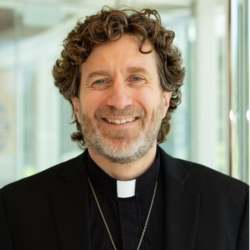
Seeing Each Other Through God's Eyes - Weekday Homily Video
Learn more about our faith | Why pray?
This chapter from Saint Luke’s Gospel is perhaps one of the most well-known and beloved in all of Scripture. Here, in response to the Pharisees’ judgment of Jesus for welcoming sinners, our Lord tells three parables: the lost sheep, the lost coin, and the lost son (better known as the prodigal son). We hear only the first two of these parables, because the Church’s cycle of readings saves the greatest and the longest, the prodigal son, for the season of Lent.
How Does God See Us?
Even though I’ve heard or read the parables of the lost sheep and the lost coin literally hundreds of times, I realized something today that I never quite recognized before. Let’s see if you share my slight surprise. Try to complete the following sentence in a couple of words: “Through these parables, I know that God sees sinners….” How would you complete that sentence? The expected answer, the answer I would have given just yesterday, is something like, “Through these parables, I know that God sees sinners with mercy and love.” And I’m not saying that is wrong.
But really, if you take the parables seriously, I now think there’s something they have in common that suggests a more fundamental answer. It dawned on me that a sentence truer to the parables might be, “Through these parables, I know that God sees sinners as still really valuable.” That is what the sheep for the shepherd and the coin for the women have in common: their value.
The Value of a Person
If you are middle class or beyond, here in America, you live in world of abundant resources: food, clothing, utilities. It’s hard for us to appreciate, in the ancient world, just how valuable a farm animal would be: a sheep could provide wool, meat, milk, and even possibly the way to honor God through sacrifice. Even if he had 99 others, it still likely would just have been unthinkable for an ancient shepherd to write one off as a loss; it was simply too valuable. And a coin needs no explanation; if the woman had 10, one of those coins represented 10% of her liquid assets; she couldn’t afford to just ignore that. That sheep, that coin, had real value; their being lost did not change that.
Every single human being has infinite value in the eyes of the Father and the eyes of His Son Jesus. God creates every human being in His image and likeness. God endows every human being with an immortal soul that He will restore to a resurrected body and that He desires live with Him in eternity. God the Son became a man and died on the Cross for every human being. Sin does not change any of these realities. When you sin, you do not diminish your value in the eyes of God. When you are lost, when you stray from God, you are still precious to God. He does not write you off; He wants you back.
The Call to Sainthood
As Christians, we are called to see one another in this same way. That was really hard for the Pharisees and scribes, and, if we’re honest, it’s really hard for us. Our natural tendency is to view sinful people as less valuable and less important, especially when their sin has hurt us. Perhaps the exception for us ordinary folks is parents with their children. So many parents hang in there with their lost and straying children -- through sin, through addiction, even though something as traumatic as incarceration. They still see their son or daughter as valuable, as precious. This image is what makes that third parable of the prodigal son so powerful.
It’s the great saints and heroes of the faith who, with God’s grace and through God’s eyes, somehow manage to see the entire human race as their children. Our own founder, Venerable Patrick Peyton, looked out on humanity as a loving father, and he saw many who were lost, separated from God and from each other. But that did not make these souls any less precious or valuable in Fr. Peyton’s eyes. In imitation of the shepherd or the woman in the parable, inspired ultimately by the Good Shepherd, he literally traveled the world seeking out the lost, to help restore them to each other, to our Blessed Mother, and most important, to the Lord.
- Today’s Readings
- Father Charlie's inspirational homily was recorded live during Mass at the Father Peyton Center this morning. You can view the Mass (and the Rosary at the 30-minute mark) on the Family Rosary YouTube page.
- To join the Rosary and Mass Livestream, visit the Family Rosary YouTube or Facebook page at 11:30 a.m. Eastern, Monday – Friday. Consider inviting others to join too! (*If you are not a member of Facebook and a signup window appears, simply select the X at the top of the pop-up message and continue to the livestream.)
About Father Charlie McCoy, C.S.C.
Born and raised in the greater Chicago area, Father Charlie McCoy, C.S.C., made his final vows in 2008 and was ordained in 2009. For most of his life in Holy Cross, he has served as a professor and a pastoral resident in a men's hall at the University of Portland in Oregon. Since Father Charlie comes from a lively, close-knit family, and since devotion to the Rosary stretches back generations among his relatives, he feels very blessed to be joining the team at Holy Cross Family Ministries to carry on the legacy of Venerable Patrick Peyton.

